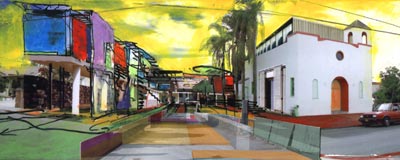|
|
Teddy Cruz is a graduate of California
Polytechnic State University, and obtained
a Master’s degree at Harvard. He founded
his agency Estudio Teddy Cruz in San Diego
(California) in 1993. As an architect, writer and
theoretician, Teddy Cruz is recognized for his
architecture, where social responsibility combines
with civic commitment and artistic motivation.
His praxis, by way of its geographical location, falls within the border
area between
San Diego in the US and Tijuana in Mexico,
where two different cultures, societies, and economies
rub shoulders and occupy one and
the same space. By zooming in on the specific
features of this bi-cultural territory, Teddy Cruz
endeavours to recontextualize global processes
and tries to produce more hybrid and more
flexible landscapes. Winner, among other things,
of the Prix de Rome (1991), PA Awards from
Architecture Magazine in New York City (2001
and 2004), the James Stirling Memorial Lecture
On The City Prize in Montreal (2004-2005), he
teaches as an associate professor at the School
of Architecture and Design at Woodbury
University in San Diego, where he has founded
the Border Institute, a research centre involved
with the border phenomenon between the USA
and Mexico. His work has been discussed in
several publications, and appeared in international
exhibitions, in particular at the show Urban
Diagnostics, which commemorated the 20th
anniversary of the Tijuana Cultural Center.
He is currently a member of the International
Editorial Board for AD Magazine in London. |
